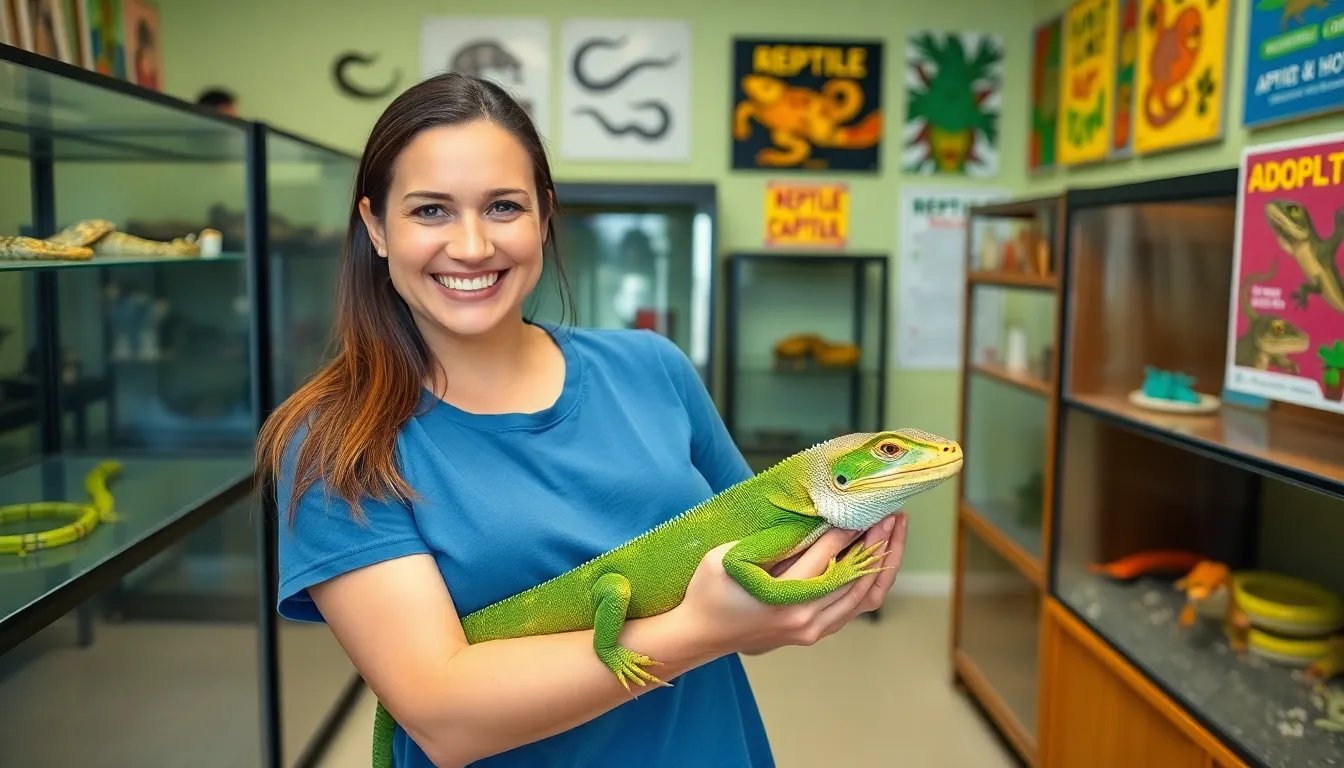Thinking about adding a cold-blooded companion to your life? Reptile adoption might just be the adventure you didn’t know you needed! From quirky geckos to majestic snakes, these scaly friends can bring a unique charm to any home. Plus, they’re low-maintenance and don’t hog the bed like some furry pets do.
Table of Contents
ToggleUnderstanding Reptile Adoption
Reptile adoption provides a unique opportunity to welcome a cold-blooded companion into a household. Many individuals discover the distinct charm that reptiles like geckos and snakes offer as pets.
What Is Reptile Adoption?
Reptile adoption refers to the process of providing a home to reptiles in need of care. Shelters and rescues often facilitate this process, ensuring reptiles receive proper treatment and new owners benefit from educational support. Various species, including iguanas and turtles, are commonly available for adoption. Prospective adopters are encouraged to research specific needs associated with each species before making a commitment.
Benefits of Adopting Reptiles
Adopting reptiles brings several advantages that can enrich home life. Low-maintenance requirements appeal to many, with reptiles needing minimal grooming. Their compact size allows for a more manageable living arrangement compared to larger pets. Educational opportunities arise for families, as understanding care requirements fosters responsibility in children. Reptiles also offer unique companionship, often displaying intriguing behaviors and personalities. Moreover, adopting from shelters supports rescue efforts, promoting the humane treatment of animals.
Finding Reptile Adoption Centers Near You

Finding reptile adoption centers nearby expands options for prospective pet owners. Numerous resources simplify the search for local reptile adoption.
Local Animal Shelters
Animal shelters often house a variety of reptiles, making them accessible options for adoption. Geckos, snakes, and turtles frequently appear in these facilities. Visiting shelters allows potential adopters to meet reptiles personally, forming a connection before committing. Many shelters provide vital information on the care and habitat requirements of each species. Adopting from a local animal shelter not only offers a home to a reptile in need but also supports the local community’s welfare efforts.
Reptile Rescue Organizations
Reptile rescue organizations focus specifically on reptiles in need of homes. These organizations can specialize in particular species and offer extensive knowledge. Many rescues evaluate potential adopters, ensuring suitable matches for both the reptile and the owner. Resources include educational materials and workshops, helping new owners understand proper care techniques. Adopting from a rescue presents the opportunity to save a reptile’s life while gaining a dedicated companion with unique characteristics.
Popular Reptile Species for Adoption
Many reptile species thrive in domestic environments, making them excellent adoption choices. Understanding the specific needs of each type aids in ensuring a proper fit for potential adopters.
Snakes
Snakes rank among the most popular reptiles in homes. Common species include corn snakes, ball pythons, and garter snakes. These snakes often require simple habitats and have manageable space needs. Corn snakes adapt well to handling, making them suitable for families. Ball pythons enjoy a low-maintenance diet primarily consisting of rodents. Garter snakes thrive in a diverse environment, needing a mix of both land and water. Each species showcases unique characteristics, making research essential to meet their care requirements.
Lizards
Lizards attract many adopters with their vibrant colors and diverse sizes. Bearded dragons represent a popular choice thanks to their friendly demeanor and engaging personalities. Leopard geckos offer another excellent option, requiring minimal care and providing entertainment through their quirky behaviors. Blue-tongue skinks are known for their docile nature and relatively easy care regimen. Understanding each lizard’s habitat and dietary needs helps adopters create a comfortable home. Researching care guidelines ensures a successful ownership experience.
Turtles and Tortoises
Turtles and tortoises make for engaging companions and possess unique traits. Some popular species for adoption include red-eared sliders and Russian tortoises. Red-eared sliders thrive in aquatic environments, requiring spacious tanks and regular filtration. Russian tortoises, on the other hand, appreciate dry habitats with ample space for roaming. Each species demands specific diets and environmental setups to thrive. Being informed about these needs allows for effective care and fosters a rewarding relationship between the owner and the pet.
Preparing for Your New Reptile
Preparing for a new reptile involves understanding its specific needs. This section highlights the essential steps to create a comfortable home for your new pet.
Housing and Habitat Requirements
Aquatic and terrestrial environments differ greatly. For example, aquariums work well for turtles and aquatic species, while terrariums suit lizards and snakes. Temperature plays a critical role; it’s vital to ensure a proper heat gradient within the habitat. This allows reptiles to regulate their body temperature naturally. Substrate choice also matters; opt for materials like sand for desert species and reptile carpet for forest dwellers. Plants and hiding spots enhance the habitat, creating a stress-free environment. Regular cleaning maintains a healthy space for the reptile to thrive, contributing to its well-being.
Feeding and Care Essentials
Diverse diets exist among reptile species. Snakes often require mice or rats, while herbivorous lizards thrive on leafy greens and vegetables. Supplementing diets with vitamins, particularly calcium, supports healthy growth and development. Appropriately sized prey is crucial; offering prey that matches the reptile’s size prevents feeding issues. Hydration options are equally important; provide fresh water daily, ensuring easy access at all times. Understanding specific dietary requirements fosters a thriving relationship between the owner and the pet. Regular monitoring of weight and health indicates if dietary adjustments are necessary.
Adopting a reptile can be a fulfilling journey that enriches lives in unexpected ways. These unique pets offer low-maintenance companionship while teaching valuable lessons about responsibility and care. By choosing to adopt from local shelters or rescue organizations, individuals not only provide a loving home but also support essential community efforts.
As prospective owners explore their options, they should remember the importance of understanding each species’ specific needs. With the right preparation and commitment, a reptile can become a cherished member of the family, bringing joy and fascination to everyone involved. Embracing this cold-blooded companion might just be the adventure many are looking for.




